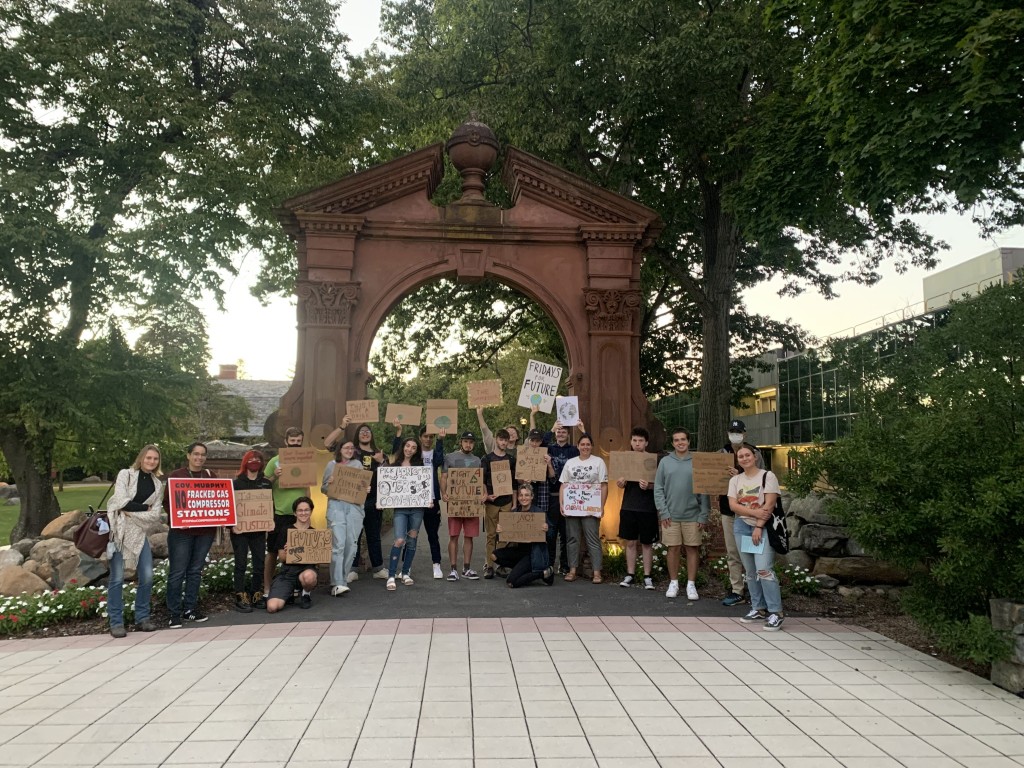
Photo by Natalie Tsur
A group of students gathered around the Arch, each holding a cardboard sign close to their chest as they watched senior Miriam Sokolska prepare them for the first chant.
“When I say ‘climate,’ you say ‘justice!’” Sokolska commanded, initiating the start of student-led climate action group Sunrise RCNJ’s first strike. Attendees and organizers rallied to challenge the expansion of the pipeline owned by Tennessee Gas Pipeline Co. that runs through North Jersey, also known as the “East 300 Upgrade Project.”
Demonstrators were joined on Sept. 24 by organizations 1STEP and Food & Water Watch in demanding for Gov. Phil Murphy to stop the project in defense of the New Jersey residents whose health it would potentially compromise. This call came hours after the Governor’s visit to Ramapo’s campus, unveiling the Peter P. Mercer Learning Commons.
The 65-year-old pipeline currently runs through Northern Sussex, Passaic and Bergen Counties. However, a new proposal calls for building additional compressor stations through the line, pressurizing higher volumes of fracked gas within a number of New Jersey towns, one of which is Mahwah.
Sokolska, president of Sunrise, stressed the importance of localizing issues surrounding climate injustice with a clear focus on racial disparity. “If they build gas compressors that release methane and mercury into the air, Indigenous peoples breathe in those toxins.”
The Ramapough Lunaape Nation is one of the state’s recognized Native American tribes whose members live throughout Northern New Jersey and New York. It falls subject to high rates of poverty, and its Turtle Clan resides on the Ringwood Mines Superfund Site, a severely polluted area.
“Ford [Motor Company] was illegally disposing lead paint on Indigenous grounds and left the metal barrels there,” said Olivia Trezza, sophomore, during the demonstration. “Not only did the lead damage the entire property, but the metal bins used [by the tribe] gave them cancer and killed many. To this day, Ford has not paid their dues at all.”
Sokolska continued to emphasize the consequences of implementing these compressors. If the Tennessee Gas Pipeline Company’s plan successfully launches, Ramapough families would be disproportionately affected by its impact, rendering their inherently vulnerable sites uninhabitable.
However, this proposal is only one contributor to the climate crisis. In recent years, the issue has become more identifiable through social movements, and both its causes and detrimental effects are revealed to be layered rather than two-dimensional. The protest soon became a learning opportunity for many, as students were able to share their experiences with intersectional climate justice, making a global issue more personal and direct.
Kian Concert, an out-of-state senior, focused on Florida’s pattern of devastation from natural disasters. “The first communities to be impacted the most were always the poorest. It was always [people of color], it was always people who needed help,” they began. “Having lived through so many hurricanes myself, something has got to change.”
A rise in heat acts as energy, fuelling what may start as a storm to quickly build into a hurricane with increasing wind speeds, scientists say. This phenomenon allows hurricanes like Ida, for instance, to rapidly increase in intensity and adversely leave many unprepared for its damage.
Though these issues may appear too large to overcome, Tori D’Amico, editor-in-chief of the Ramapo News and vice president of Sunrise, points out that financial support from corporations and political leaders is quintessential to ensure global sustainability. “The one percent continues to have their Met Galas, their space rides and profit multi-billions every single day while the poor get poorer and the rich get richer,” said D'Amico, also editor of the Ramapo News.
Sophomore Danielle Bongiovanni explained that power lies in numbers, encouraging all protest attendees to call state officials and demand the project be stopped. Sokolska and Bongiovanni curated a media toolkit for students, which outlined a letter template as well as relevant contact information to reach Murphy and members of the Mahwah Township Council.
“We can’t let it happen anymore. They need to take action for the problems that they are causing,” D’Amico said, galvanizing students to use their voices in advocating for the longevity of not only the planet, but of those whose systematically ailing livelihoods are aggravated by climate change.
ntsur@ramapo.edu





